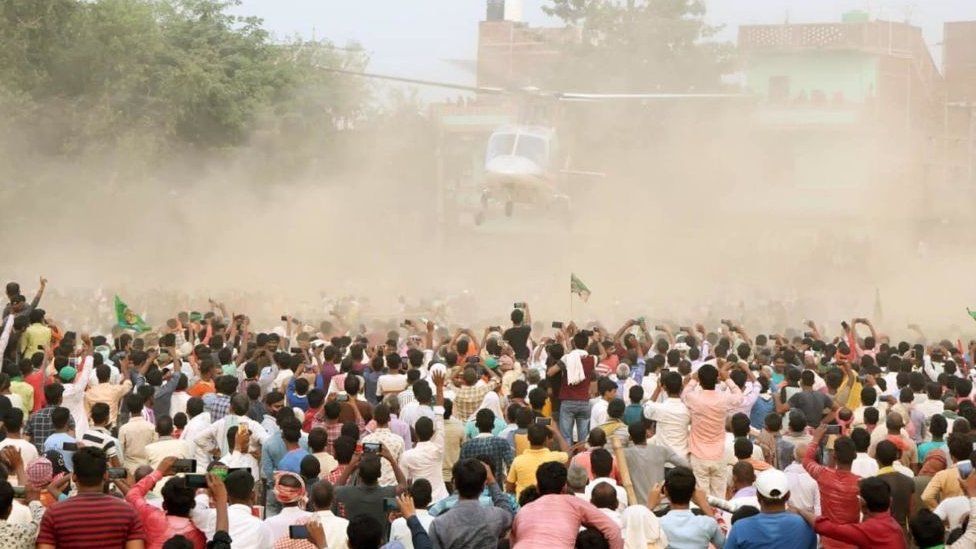Bihar elections: Huge crowds gather at rallies, raising coronavirus fears
- Published

Indian Prime Minister Narendra Modi on Tuesday asked people not to be complacent during the festive season, urging them to continue wearing masks and follow social distancing.
But the message doesn't seem to have reached the northern state of Bihar where large crowds have massed at political rallies ahead of state elections, scheduled to begin on 28 October.
All parties, including Mr Modi's Bharatiya Janata Party (BJP), have ramped up campaigning ahead of the elections.
Footage from some of the rallies shows people jostling to get a glimpse of politicians, and hardly anybody appears to be wearing masks.
Virologists and doctors called the large gatherings "callous" and said that such complacency could have devastating consequences, enabling the virus to spread much faster.
India has recorded more than seven million cases so far, but its daily case count has been steadily dropping in recent weeks even as testing has remained consistent. Although some have said this suggests that the worst of the pandemic is over, others have cautioned against celebrating too soon.
The Election Commission has also warned politicians against flouting Covid-19 safety rules. But it seems to have had little impact as crowds continue to gather at rallies.
Virologist Dr Shahid Jameel says political parties need to be more responsible and they need to educate their cadre.
"We see thousands of people in these rallies and hardly anyone with a mask. It is the responsibility of every political party to ask its followers to follow safety rules.
"That is the only way we know to prevent infection [from spreading]," he told the BBC.
The first phase of polling will be held on 28 October, and the other two phases will follow on 3 and 7 November. Results will be announced on 10 November.
The BJP-led coalition is seeking to be voted back into power - it's facing opposition from an alliance of the Rashtriya Janata Dal and Congress party, and also from other regional parties.
The stakes are high for all political parties. Their initial campaigns were virtual but now they have moved offline.
Allow Twitter content?
This article contains content provided by Twitter. We ask for your permission before anything is loaded, as they may be using cookies and other technologies. You may want to read Twitter’s cookie policy, external and privacy policy, external before accepting. To view this content choose ‘accept and continue’.
Mr Modi is addressing three rallies on Friday and Congress party's Rahul Gandhi is also holding campaign events.
A senior journalist in the state told the BBC that nobody "was really talking about coronavirus as a campaign issue".
"It seems like the virus has disappeared from the state. People have become complacent and politicians are not doing enough to warn people," he said.
The state government says it's conducting an average of 150,000 tests per day and positive rates have declined in the past few weeks.
But experts are sceptical because most of the tests are rapid antigen tests, which gives results in 30 minutes but have an accuracy rate that, in some cases, is as low as 30%.
Bihar Chief Minister Nitish Kumar on 22 September said that the state had conducted nearly 200,000 tests a day earlier. But only 11,732 among those were done through the RT-PCR method - which is the gold standard of testing.
Experts say that this is risky since rapid antigen tests increase the chances of false negatives. So people can move around spreading the disease after they are "falsely" declared negative.
Leading pulmonologist Dr A Fathahudeen says Bihar simply cannot afford to flout safety rules because that will only exacerbate its problems.
The state has one of the worst healthcare systems in the world and has a shortage of doctors, trained paramedics and nurses.
A spike in the number of cases in July and early August had completely overwhelmed the state's healthcare system. Some families were forced to arrange oxygen cylinders for patients, and some people died without getting any treatment.
"The state has a high population density and that means people live in large joint families. Many young people will go back to their parents after attending these rallies and may carry the infection home," Dr Fathahudeen adds.
The ongoing festive season and weather will also play a role in how the virus spreads in the state. Air quality in northern India significantly worsens November onwards as temperatures drop. And several studies have suggested that pollution increases Covid mortality and infection rates.
"Looking at these pictures [of rallies], lowering temperatures and the coming festive season, I am scared what turn India might take if we are not careful over the next few weeks," says Dr Jameel.
Experts say what's happening in Bihar can affect how other states deal with the virus.
Dr Fathahudeen says the perception that "young people don't get the worst of the virus" is spreading as fast as Covid-19.
"There is no guarantee that young people won't get seriously ill. The elderly are more vulnerable but everybody needs to be equally careful," he says.
And when people in other parts of the country see such large crowds, they may think that the virus is not spreading anymore, Dr Fathahudeen adds, which can have dangerous consequences.
"I am alarmed," he says. "We can't hold elections at the cost of people's health."
- Published27 July 2020
- Published20 October 2020